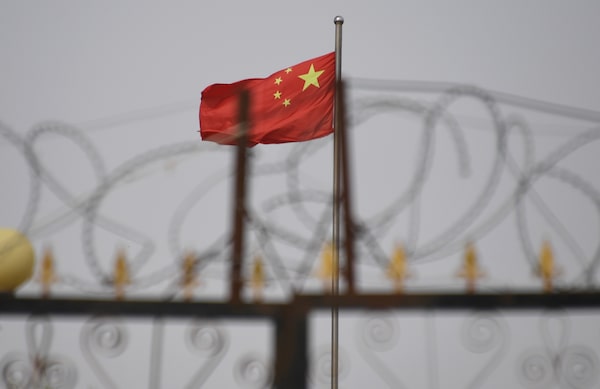
A Chinese flag behind razor wire at a housing compound in Yangisar, in China's western Xinjiang region, on June 4, 2019.GREG BAKER/AFP/Getty Images
Individuals and companies in China’s northwestern Xinjiang region are suing a U.S.-based researcher who has uncovered extensive documentation of the country’s efforts to incarcerate, indoctrinate, sterilize, relocate and transfer to distant factories large numbers of Uyghur people.
The legal attack on scholar Adrian Zenz coincides with a broad new effort to silence critics who have brought to light China’s treatment of Uyghurs and other predominantly Muslim groups in what Beijing calls an anti-terror campaign. Critics call Beijing’s actions crimes against humanity – even genocide.
In Canada and around the world, Chinese emissaries are presenting glossy, factually questionable accounts of life in Xinjiang. In China, government spokespeople and state media are attacking critics and publishing accounts from officials praising the country’s efforts in the region.
The lawsuit, however, marks a novel use of the country’s Communist Party-controlled courts, a demonstration of Beijing’s willingness to demand a legal price for criticism of its policies.
Mr. Zenz, a senior fellow in China studies at the Victims of Communism Memorial Foundation, is accused by the unnamed plaintiffs of spreading “rumours” about forced labour in Xinjiang that “damaged their reputation and caused them to suffer economic losses,” state media reported. The civil suit demands that Mr. Zenz “apologize, restore their reputation and compensate them for their losses.”
Chinese state media disclosed no further details about the lawsuit, and it was not possible to get a copy Tuesday.
The filing of a lawsuit is “what they do to someone they can’t just arrest,” Mr. Zenz said in an interview. “Above all, it is a sign of their growing desperation. They have lost all credibility and are resorting to mud-slinging.”
Mr. Zenz, who is not in China, has been singularly influential in discovering, translating and publicizing government reports, procurement documents and internal recommendations that have charted authorities’ shifting campaigns in Xinjiang. The Globe and Mail and other Western news outlets have cited his work.
The Chinese government has called his findings “lies” – even when it confirmed them. For example, Mr. Zenz has described a dramatic decline in natural population growth rates in Xinjiang. In a January report, the Communist Party-run Global Times called this “Lie 1,” illustrated by a chart showing a 46-per-cent decline in the region’s population growth rate between 2017 and 2018.
Late last year, Mr. Zenz wrote that “hundreds of thousands of ethnic minority labourers in Xinjiang are being forced to pick cotton by hand through a coercive state-mandated labour transfer and ‘poverty alleviation’ scheme.” Weeks later, the United States banned all imports of cotton from the region. The Chinese government has sought to parry Mr. Zenz’s findings by citing increased use of machines to pick cotton.
But a senior Chinese researcher recently told The Globe that between one and two million trips per year are made by people in Xinjiang “to engage in work such as picking cotton.” The Globe is not disclosing the name of the researcher because they were not authorized to speak publicly.
On Tuesday, however, officials in Xinjiang made a new attempt to publish sunnier perspectives.
In southern Xinjiang, where the Uyghur population is more dominant, “people walk on broad and smooth asphalt roads, live in comfortable houses,” while “railways extend in all directions and flying by plane is extremely convenient,” wrote Abdushukur Heyt, a Uyghur man who is secretary of the Communist Party Committee at the Water Resources Bureau in Kashgar.
“Today’s happy life is brought to us by the Party and the country.”
His account of life in the region was among a series of signed articles published by state media.
Chinese authorities have sought to export that message, too.
On March 6, the Chinese consulate-general in Calgary bought an ad in the Calgary Herald that read: “Xinjiang, what a place to go!”
The promotion described the wonders of the ancient city of Kashgar, which is “still well preserved after renovation.” Kashgar’s Id Kah Mosque, the ad said, welcomes “thousands of worshippers every Friday.” And numerous bed and breakfasts provide “good opportunities for visitors to enjoy the family life” of Uyghur residents. The ad suggested prospective visitors “simply search for ‘Xinjiang, China’ on Airbnb.”
Its sales pitch, however, is at odds with reality. Over the past 15 years, authorities have torn down large parts of Kashgar’s old city, citing the need to build new, earthquake-proof structures. Government statistics show that more than 96 per cent of households in the area have been affected.
At the Id Kah Mosque, visitors in the past few years have reported that the religious site has been transformed into a tourist destination where people at Friday prayers now number only in the dozens. More recently, the mosque’s main entrance has been padlocked. On Tuesday, no one answered calls made to three listed numbers.
On Airbnb, meanwhile, many Xinjiang locations specifically say they cannot accept foreign nationals. The Globe reached out to more than a dozen Airbnb and other hosts in the region. Only two said they could accept foreigners, although one promised to do so by calling an international visitor “a friend of my family.” Authorities have detained Uyghurs and others in Xinjiang for contact with foreigners. Airbnb did not respond to a request for comment.
Our Morning Update and Evening Update newsletters are written by Globe editors, giving you a concise summary of the day’s most important headlines. Sign up today.
 Nathan VanderKlippe
Nathan VanderKlippe